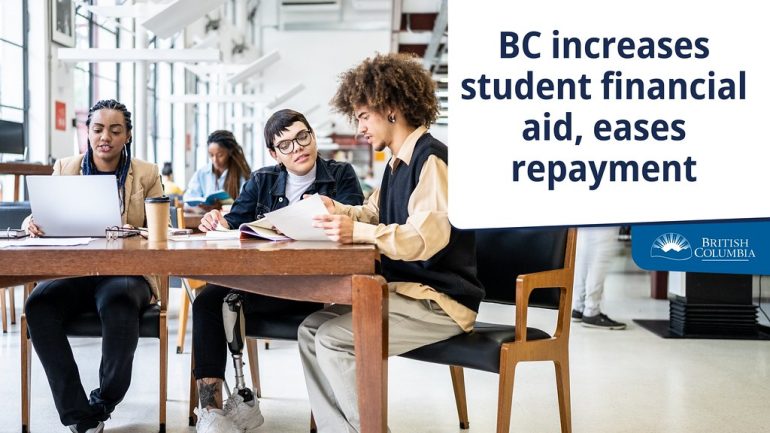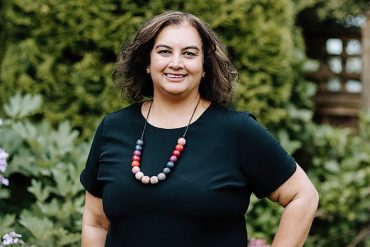Post-secondary students will soon have access to increased financial aid, with more flexible repayment terms to make education and skills training more accessible and affordable in the face of global inflation.
“Access to finances shouldn’t be a barrier to preparing for an in-demand career in B.C. This is an immediate-term action to make education more accessible, as we continue the work on our medium-term plans to review the post-secondary funding model and expand the BC Access Grant,” said Selina Robinson, Minister of Post-Secondary Education and Future Skills. “Making education more accessible and affordable is a major focus for our government and an important part of our Future Ready plan.”
Starting August 2023, this will be the first increase to weekly student loan maximums since 2006. After making student loans interest-free in 2019, the B.C. government is increasing financial assistance available to students from $110 to $220 per week for single students and from $140 to $280 per week for students with dependants.
Students applying for student financial assistance will automatically be considered for the BC Access Grant, which provides as much as $4,000 per year to students with middle and low incomes at B.C.’s public post-secondary institutions. The grant was launched in 2020, the first new grant program in 15 years.
The new increases to financial aid will help students pursue an education path of their choice and build a career. This is part of StrongerBC’s Future Ready plan, which is working to remove barriers and open more opportunities for post-secondary education and skills training, so people can get good jobs and build good lives in British Columbia.
Effective August 2023, government will change student loan repayment terms to align with the federal government’s Repayment Assistance Program, increasing the income level from $25,000 to $40,000 under which a student does not have to repay their loan, with the amount indexed to inflation. The maximum monthly repayment amount will be lowered from 20% to 10% of household income.
“Receiving financial aid from the B.C. student loan program has allowed me to pursue my dream of becoming a registered nurse,” said Lois Gill, a third-year student in the bachelor of science in nursing program at Vancouver Community College. “While completing my studies, I feel secure in my finances so I can meet my basic needs and study at the same time, while planning for my future academic goals, such as becoming a nurse practitioner.”
Increasing weekly student loan maximums will be funded through a $151-million investment over three years in Budget 2023.
Investments in student financial aid support the StrongerBC Future Ready plan to make post-secondary education and skills training more accessible. Budget 2023 invests $480 million over three years to support Future Ready’s work to break down barriers to post-secondary training so more people can get the training they need for in-demand careers and employers can access the talent they need.
Quick Facts:
- Interest-free student loans have saved British Columbians $40 million since 2019.
- Combined with federal student loans, a person with no dependent children can receive as much as a maximum of $520 per week, while people with dependent children can receive as much as $740 per week.
Learn More:
Learn more about StrongerBC’s Future Ready plan: https://strongerbc.gov.bc.ca/jobs-and-training/
Learn more about Budget 2023: https://www.bcbudget.gov.bc.ca/2023/default.htm
Learn more about student financial aid: https://studentaidbc.ca/
A backgrounder follows.
Backgrounders
Province making life more affordable for post-secondary students
Government understands that global inflation and the increased cost of living is creating affordability challenges that affect students. That’s why, since 2017, the Province has implemented new measures to make life more affordable:
Building more affordable student housing:
- More than 7,700 student housing beds are built or underway, with more to come, so more students can find affordable, on campus housing.
- The government is investing $575 million for student housing over three years and $1.1 billion over 10 years.
- Projects underway include:
- 386 beds at Simon Fraser University in Burnaby with a provincial investment of $73 million; and
- 217 beds at North Island College with a provincial investment of $75.9 million.
Making tuition more affordable:
- Former youth in care in B.C. of all ages will have their tuition waived for post-secondary education starting Aug. 1, 2023, as government takes action to remove age requirements for the Tuition Waiver Program.
- More than 55,000 students have received more than $85 million through the BC Access Grant to help with costs such as tuition and living expenses.
- The B.C. government has ended interest payments on student loans, saving students approximately $40 million since 2019.
- Investments in zero-cost textbooks have saved students more than $31 million.
- The Tuition Limit Policy ensures tuition and fee increases remain low and predictable by maintaining a 2% cap on domestic tuition and mandatory fees annually
Photo: (flickr.com)



